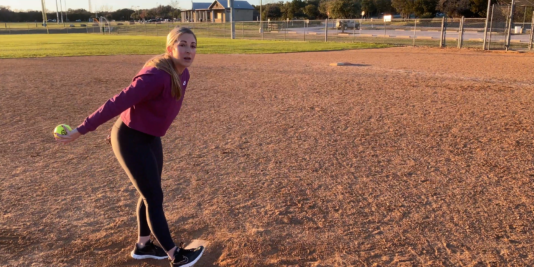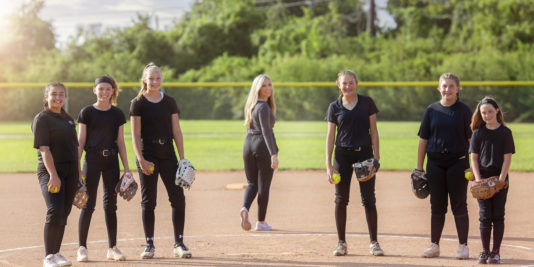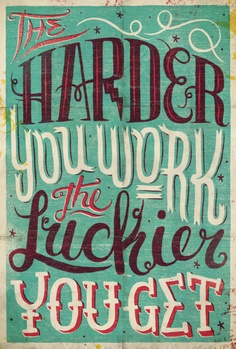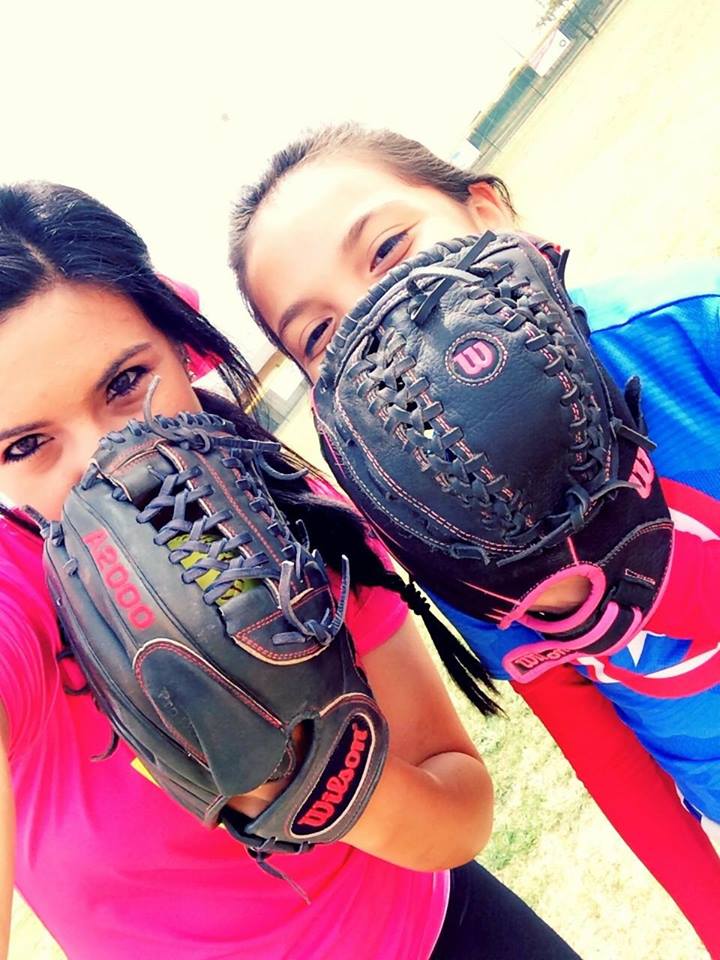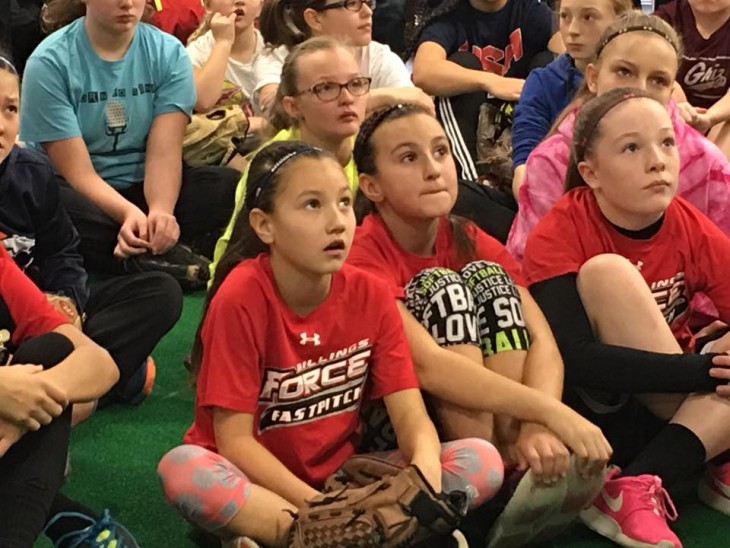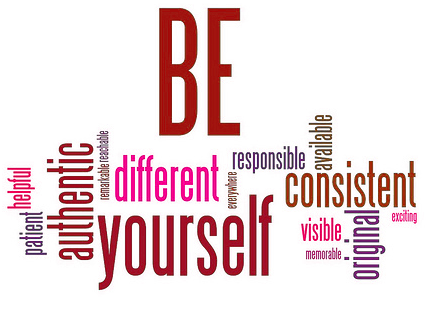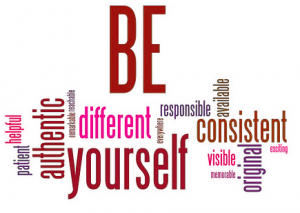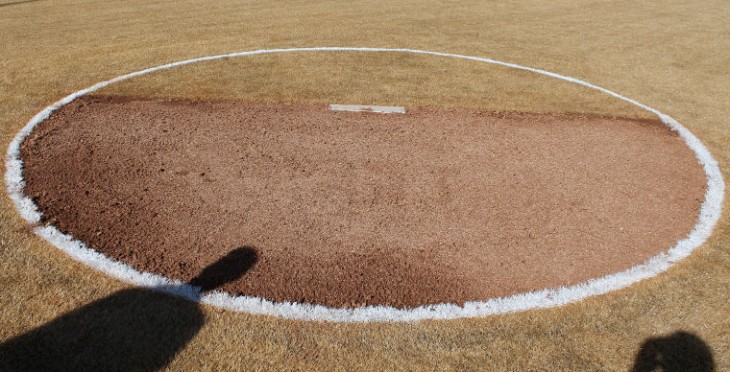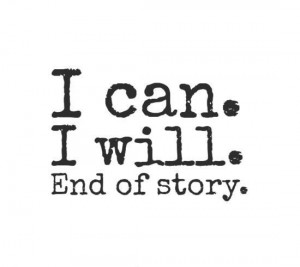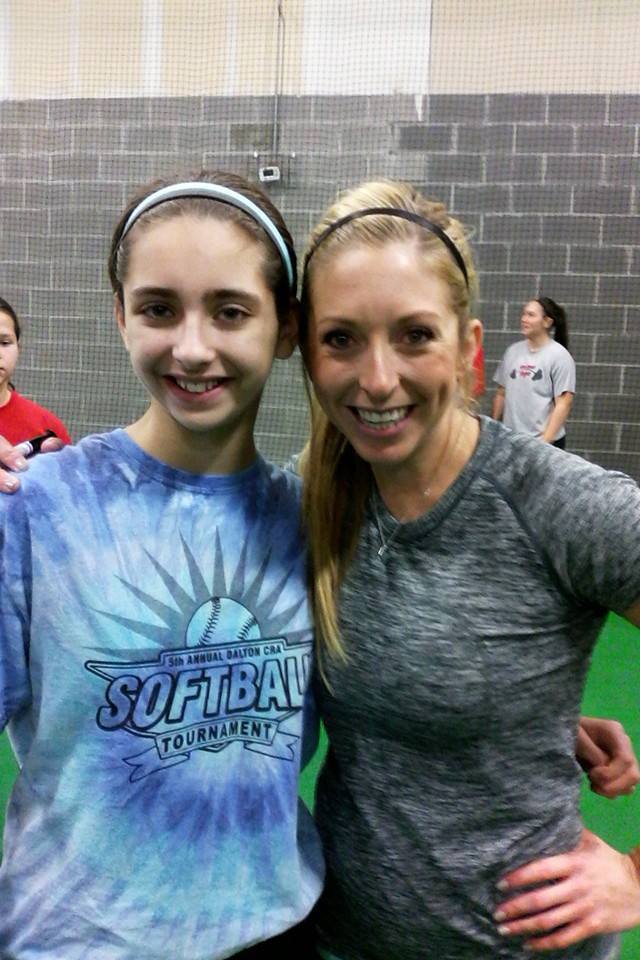So you go to a clinic, there are a lot of other girls there, and that means you need to find a way to stand out of the crowd. It could be at one of our Packaged Deal clinics, or it could be at the clinic of your FAVORITE university. Maybe you’ve never heard of the people who will be instructing, maybe you’ve been counting down the days until you got the chance to go to this clinic. Either way, there are ways that you can STAND OUT from the 40 or even 100+ girls you are at the clinic with. Don’t you want to make a good impression? Standing out (for all the RIGHT reasons) can only be a good thing, because you never know WHO people know, and who might be able to put in a good word for you somewhere down the road….
Take for example your goal is to play at the University of Michigan, but you’re from Florida and you’re at Packaged Deal clinic in Florida. There’s us (the four girls from PD), and then also guest instructors at our clinic. Though you’re thousands of miles away from Michigan, one of those coaches may know the Michigan head coach. It takes just one phone call or one text to Carol Hutchins (Michigan Head Coach) to say, “Hey Coach, you’ve GOT to see this girl from Florida play, she’s the type of kid you would want on your team.” Or…the opposite could happen. Maybe one of us run into Carol Hutchins at a tournament and she says, “Hey, have you ever worked with this one girl, she’s from Florida, really wants to come to Michigan she said she’s been to one of your clinics. How was she?” We will have to respond with the truth. If you didn’t’ hustle, if you weren’t coachable…we have to tell her that.
There are things you can do to make a great impression and represent yourself the best so you have a better chance at achieving your goals. Be memorable…
-
Walk in with confidence – even if you have to fake it.
Ok, so you’re a little nervous. You don’t know what to expect, you’ve never even been to the facility before. You don’t know how many people are already going to be there. You have ONE chance to walk in for the FIRST time – be aware of what you look like! Even if you have to fake it, walk in with confidence. Walk in with a look in your eyes of excitement. Walk in with the feeling of not caring what anyone might say about you. From the minute you get out of the car, own it….own how you carry your bat bag, to the way you open the facility door, to the way you put your shoulders back and walk like you BELONG.
-
Meet a friend, introduce yourself to new people
You might not know anybody at the clinic, but that’s totally ok! It just means you have a chance to make a NEW friend. While you’re waiting for the clinic to start, you could go up to another person who looks like she is by herself and introduce yourself. Then, once the clinic starts, it feels like you know someone there. If you are broken into groups, take it upon yourself to meet your other group members. Find out their name, maybe even where they’re from. Who knows…you could meet a lifelong friend if you just put yourself out there!
-
Eye Contact
THIS is a big one. When an instructor is talking to you individually or in the group setting, give them your BEST eye contact. Even if they’ve been talking for a little while, lock in and give your focus. This means…no playing with your glove or your shoe laces or looking across the facility at what distracting things may be going on. You’ll soon realize, the more eye contact you give, the more the instructor gives you because she knows you are LISTENING. Take away eye contact from a clinic and bring it to conversations with your parents, brothers, sisters, teachers, coaches and even friends.
-
Hustle – No Walking
Hustling is infectious to the rest of the players who are at the clinic. It even makes the COACHES want to give more/ The minute the clinic starts, there is no walking. – similar to not walking in between the lines out on the field. Hustling from station to station allows you to get more work in. Hustle is the sign of an athlete wanting to get better and not wanting to waste any time. DO NOT walk. Even if it seems like a short distance, just pick up your pace and hustle over when you’re changing stations or going to get water.
-
Try New Things
Come into the clinic and BE OPEN. The worst mindset you can have when you go to a clinic is to be close-minded and unwilling to change. A clinic can help grow you by making you feel uncomfortable and pushing you to try new things. If you are open to trying new things, you never know what new drill or piece of information can take your game to the next level…
-
Don’t Make The Same Mistake Over and Over Again
A clinic will allow you to go through lots of REPS. Don’t make the same mistake over and over again without making an adjustment at each station. If you are making the same mistake, then you are not learning, and it gives the impression that you are uncoachable and/or that you do not care that you’re making the same mistake over and over. On the other hand, if you make quick adjustments, it gets noticed. Making quick adjustments shows that you have great body awareness AND that you are coachable. Being coachable is one of the BEST things someone can say about you to someone else. Especially a coach who might be recruiting you.
-
Be Inspired
Be inspired by the instructors, not afraid of them. Sure, they might be a little intense, they might be loud, and they might pick up on things you’ve never heard before or done before. But, don’t be scared of them, be inspired by them. At the end of the day, they most likely have been in YOUR shoes in the past. Listen and hang on every word they are sharing with you because their goal is to have you leave the clinic feeling more motivated than when you came in.
-
Make Sure The Station is Clean Before Rotating
If you’re at a station where you’re going through a lot of balls, do not rotate to the next station until every single ball has been picked up. Leave the drill like you found it. Do NOT leave one person to be the person who is always the last one picking up the balls. Do NOT rotate without your entire group. This may seem like a small thing, but it speaks volumes about your character and the type of teammate you are. Softball is a team sport, being a good group-mate more than likely means that you’re a good teammate. This I know with certain is Jen Schro’s #1 way to stand out for the WRONG reason if you leave balls behind…
-
Write Down Important TakeAways
You just learned a TON of information. After the clinic is done, go WRITE DOWN (not text) things that you learned from the clinic. Maybe it’s a quote that sticks out in your mind that really hits home, maybe it’s a drill, maybe it’s a mechanical fix that someone helped you with that you need to work on. When you write things down, you’re more likely to remember them, and go practice them. This will help you elevate your game faster.
-
Thank Your Parents
Say THANK YOU to your parents (and/or whoever brought you) for letting you attend the clinic. Never forget that almost every clinic you go to costs money to allow you to participate. That money comes from someone’s hard work. Your parents are working hard to earn that money so that you can enjoy a sport that you LOVE. What THEY love is when you show appreciation. Your parents would do anything for you, but saying thank you makes them feel good and makes them want to continue to do things for you. You can write them a note, send them a text, or tell them when you’re leaving the facility. Whichever way you feel most comfortable, make it happen and never take things that you have or get to do with softball for granted.
3 Things To Do Post Clinic:
-
Follow all forms of social media.
By following on social media, you have a chance to stay connected with the instructors one your clinic is done. By staying connected, you can now ask questions, learn new drills they post and also find out when they will be back in your area. By staying connected, you are showing that you’re invested and passionate. Find new drills even AFTER the clinic, they’re there for YOU. Softball knowledge is posted daily and it’s all for YOU. So even though you might not be physically WITH the instructors, you’re still apart of their tribe and can benefit just from following their social media accounts – as a whole and individually.
-
Practice the drills daily/weekly.
The only way the drills that you learned will work is if YOU work. So get to it. Go practice the drills or mechanically positioning you learned and WORK to get better. You will leave the clinic on a high of excitement. Use that feeling to build momentum to take into your practices, working on the drills you learned. Most likely you learned drills that you could do on your OWN, even without anybody else. How bad do you want it?
-
Continue to thank your parents for the investment they are making to allow you to play softball.
Not just after the clinic, but for the rest of your softbsll career, thank your parents. NEVER take what they do for you for granted. Softball is a time investment and a financial investment and they do not HAVE to let you play softball. The gas, the time driving, your clothes, your cleats, your equipment – all of these things cost money. So, THANK your parents and be appreciative for them letting you play the sport you love.

